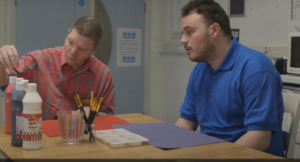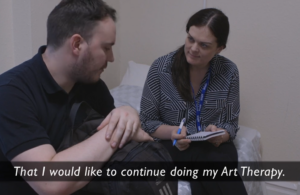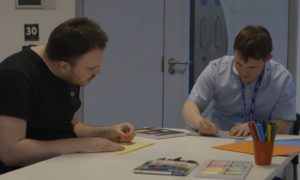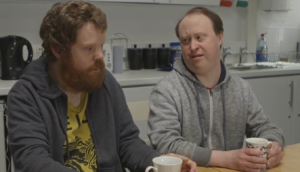Learning disabilities: co-producing effective art therapy
As many as 20% of qualified art therapists have reported that they work with people with learning disabilities. This course, developed using coproduction with people with learning disabilities, draws together clinical experience and research evidence to support arts therapists and trainees to develop their skills and confidence when working with this client group.
Learning disabilities: co-producing effective art therapy
As many as 20% of qualified art therapists have reported that they work with people with learning disabilities. This course, developed using coproduction with people with learning disabilities, draws together clinical experience and research evidence to support arts therapists and trainees to develop their skills and confidence when working with this client group.
About art therapy in this area
People with learning disabilities suffer higher levels of mental illness than the general population. Communication can be difficult for this client group, which can mean that they suffer for longer before being able to access support.
Arts therapies offer a less-verbal therapeutic medium to support expression, build personal resources and to begin to make changes in someone’s life.
Definition of learning disailities
For this course we are using the World Health Organisation definition of learning disability. A person who has a cognitive impairment, which emerged in childhood (usually before aged 5) and which affects their social and adaptive functioning across their lifespan.
Although autism is often seen alongside a learning disability this course is not specifically focussed on supporting people with autism. Similarly, for people with learning difficulties such as dyslexia or dyspraxia or people who have an acquired brain injury, this course may not be relevant.
What you will learn
We will introduce the current global evidence base through systematic review and explore the emerging theoretical foundations of the work we do in arts therapies with people with learning disabilities. We will also look at the range of adaptive practices which art therapists already undertake to maximise access for this group of people.
Using a range of online creative methods, based in both art making and theatre practices, we will develop clinical and professional thinking, through considering issues such as:
- Working within the person’s support network and within a healthcare team.
- Different contexts and the barriers or facilitators to art therapy work.
- Clinical reasoning when a referral reaches you.
- The range of issues which a person may bring and working across the lifespan.
- how the arts therapies support mental health recovery and coping.
On completion of this course you will be able to:
- Understand the current evidence base for art therapy globally, both group and individual interventions across a range of settings for this client group.
- Implement a range of reasonable adjustments which will make art therapy as accessible as possible for this client group.
- Advocate for art therapy interventions through being able to describe your model of art therapy practice (or have the tools to develop your practice) from initial treatment aims to client outcomes.
- Use personal art making to support your clinical thinking and offer opportunity for self-care.
Although primarily aimed at those working with adults, arts therapists working with children and young people are also very welcome to attend.
How you will learn
Throughout the course we will work individually and in small groups, with reflective larger group discussions.
Tutors
Nicki Power, Alison Hawtin, and actors and artists from the Lawnmowers Independent Theatre Company with Claire Hills-Wilson.
Images courtesy of the Lawnmowers Independent Theatre Company.
A really well-run, informative and engaging training.
Frequently asked questions
Bookings for our online Introduction, Foundation, ARTiculate, CPD and Masterclass courses close one week before the start date, at 10.00am.
Joining instructions and materials will be available in your Memberzone, under bookings, once bookings have closed. A reminder email will be sent out to delegates one week before the course.
It is the attendees’ responsibility to check they have access to the joining instructions before the course. Contacting the office on the day or evening before the start date will not always be responded to prior to the course starting.
Employer funded bookings are available for our online Introduction, Foundation, ARTiculate, CPD and Masterclass courses.
These bookings can be made on our website by paying by card at no extra cost. The booking should be made on the delegate’s account as we will need their contact details for the course. If they don’t have an account they can create one for free here. The employer will be required to provide their credit/debit card details to complete the payment. Please also tick the employer funded option at checkout.
If your employer wants to pay by invoice, you will need to complete our Invoice Details Request – Course Booking Form, and return it to us along with a PO number. Please note, we cannot accept the form without a PO number. Please note, there is an additional £20 admin fee for bookings via invoice.
If you need further assistance, please contact us at events@baat.org.
Find out more information regarding our Accredited diplomas.




